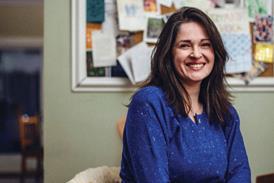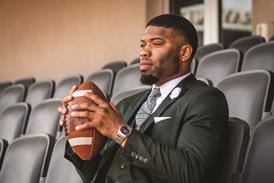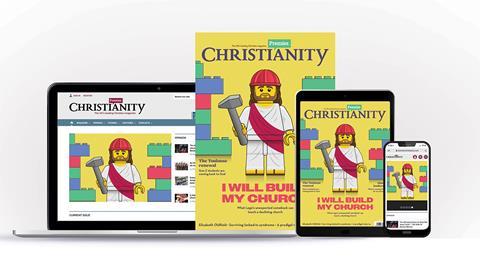Heidi Baker has devoted her life to serving the poor in Mozambique, but she also sees great poverty in the western world
When we arrive to interview Heidi Baker we are absolutely drenched due to a sudden downpour in Oxford. “You poor things,” she says. We are urged to take off our socks and hang them on the radiator. She is so sympathetic that I start to feel a little sheepish.
For last night, she told the congregation of St Aldates Church in Oxford of the journey she had from Mozambique to get here. It began with taking the gospel to an unreached people group – the Makua – a few days earlier (a not insignificant side issue as it had taken her the best part of two years to get to them in the first place). She’d reached them by boat, but the boat died and she and her small team were stranded. They were rescued by fishermen, but that boat stopped on the water.
So there was Heidi and her team being flung backwards and forwards in the sea and all convinced they were going to die. Amid gasps and whoops and cheers she tells the twists and turns of her story – being attacked by fireants, rescued by another group of fishermen, all of whom became Christians on the boat, walking for miles through a town which is notorious for bandits, before finally hitchhiking back to her village.
At this point, the congregation bursts into applause and you see people murmuring in disbelief. It’s like a journey from Treasure Island or Robinson Crusoe, not from this well put together, made up, blonde haired Californian woman. In a way, the story is a good reflection of the wider picture of Heidi Baker’s life.
Baker has lived in Mozambique since 1995 when she and her husband Rolland felt called to go there and live among the poor. She describes the events leading up to them going to Mozambique in her books including The Hungry Always get Fed and There is Always Enough. Together, they set up and continue to run Iris ministries, which has planted thousands of churches in Mozambique and seen tens of thousands of people become Christians. Their prayer letters and blogs include countless stories of miraculous healings, of people coming to faith, and implore again and again, that we pray for them to know Jesus more.
“We work among the poor, we work among orphans and widows,” she days, describing her work. “We bring orphans into the spirit of adoption so that they know they’re adopted and loved. We’re very simple. We’re a holistic ministry. We look at what love looks like for the people that we’re working with.” This, she says, is the guiding question for all the work they do.
“For the Mozambicans, if they walk 20 hours for water, love looks like a well, if they’re hungry, love looks like rice and beans, if they have no school, incarnational love looks like us building them a school and providing them a teacher. “We say, ‘Help me God, to know what love looks like and don’t allow me to stop when it’s difficult.’”
And it certainly does get difficult. She laughs wearily when I ask about spiritual attack. “No, no, there aren’t attacks, everything’s fine, I’m fine, you’re fine, we’re all fine,” then she lists, in her matter of fact way, the other side of life as a missionary in Mozambique. “We have incredible attacks. We have children die, we have missionaries die, we’ve been beaten, thrown in jail, slammed against walls, we’ve been stoned, we’ve been shipwrecked, we’ve been cold, we’ve been lonely, we’ve been afraid. We’ve been attacked.”
She talks with the same simple acceptance about the miracles they have experienced – the multiplication of food, the deaf, dumb, blind and crippled people they have seen healed. There seems no point in asking her about the theology of miracles, or whether we should teach people to expect these things, or how to reconcile a God of love with suffering. This is just the way life is. “We’ve seen the blind see and the deaf hear and our little bush village pastors see the dead raised, but we also see some of our pastors killed. We also have homes for the blind, homes for the handicapped. We press in for the kingdom, we see the most amazing miracles, it’s so exciting, we’re like, ‘Oh God, we get to be alive right now!’ but we also see incredible suffering. It’s a cup of joy and suffering that he’s asked us to drink and we gladly drink.”
It is not just her home life which makes Heidi Baker so different from many of her contemporaries with their polished sermons and expensive hotels. As a conference speaker she is compelling, and memorable, but anything but polished. She giggles, loses her way, interrupts herself with stories, goes off on tangents, throws in red herrings… It’s almost like a class in how not to give a talk.
She begins both of her talks at St Aldates by lying on the floor for five minutes and singing out long notes. She then prays for the Holy Spirit to ‘find a resting place’ in her. She giggles a lot and her speech is punctuated with ‘wow’ and ‘shabbah’. But she doesn’t see it as eccentric, she describes it as being filled with the Holy Spirit.
“I contend to be fully filled and whatever that looks like, I’m happy with that. The Holy Spirit in me looks different to the Holy Spirit in you, he touches us through our human framework, he loves our personality. God loves us all. I’m just free to be me in God.”Baker is a compelling storyteller. She talks about pastors being raised from the dead, but also about a pastor friend of theirs who had his hands and feet and tongue cut off by ‘people of another faith’ before being murdered in front of his wife and six children. “We are all in shock and we want it to be a victory story,” she says, gathering speed. “He has no feet and he has no hands and he has no tongue and then they cut off his head and he’s dead.” Pause. “The church could say, ‘Don’t talk about that story. Just talk about Franci [who was raised from the dead] and talk about those eyes that have been changed from white to grey to brown.’ I am thrilled to speak of those stories, but we also have a home for the blind.
We also have those who have lost their life for the sake of love. Those stories are no less powerful. Because that man died and then his cousin came and called the entire village to come forth and said, ‘We will not be stopped because you cannot silence love. You can chop off our feet and we’ll keep coming. You can chop off our hands and we’ll still love you. You can cut out our hearts and we’ll still love you, because the love of Christ never dies.’” As she’s speaking these words, she cries and whispers, and you get the sense that she has poured everything of herself into the telling of this story. “All those people from another faith, thousands of them bowed down and wept, and received Jesus for the first time.”
She is utterly compelling to listen to, but not because she’s polished – she isn’t – but because it’s all so real. There is enough drama and emotion in the plain, raw facts of her everyday experiences. She doesn’t need to dress the stories up or think about how she presents them.
Her central message in Oxford is about being yielded to God. “What if everyone in the room just yielded themselves to God? What could happen? Everything.” Yes, we might be broken down, beaten and persecuted, she says, but it doesn’t matter what it costs because we should consider it pure joy. “You do not give up and you continue to love, no matter what it costs you.” And you know that, for her at least, these are not empty sentiments.
In person, she’s less high energy than on stage, but has a sort of gentle intensity to her. She smiles and laughs, hugs us, prays for us. And when she starts to talk, she rarely breaks eye contact. She looks at me like I’m mad and then bursts out laughing when I ask whether she ever considers her public persona, or thinks about delivering a polished ‘product’ like preachers and speakers sometimes appear to. It’s like she’s never even thought of it. “I contend to be fully filled. I ask the Holy Spirit to do what he likes to do through my little life and so I just ask him to fill me and use me and so I don’t think about what someone else needs to do.”But she’s not dumb, or flaky, or airy fairy. Her outward appearance belies a tenacity and strength of character. When you ask her about something she feels really strongly about she is passionate and articulate. Baker inhabits two quite distinct worlds – her life living with the poor in Mozambique and her time spent preaching and teaching in what she calls the one third world – mainly at conferences and large gatherings, like this Love Oxford event.
“I travel one third of my life. I don’t travel to fundraise. Obviously we need tons of money to feed all those kids and to run the schools and clinics, it’s a huge amount, but I travel to see fresh bread from heaven in my little way. God has called me to bring fresh bread to the one third world, one third of my life. Also to see the eyes of the poor in spirit here opened up. Many, many people here just don’t know how needy they are. It’s really saying, ‘You need fresh bread too, you need the presence, you need more of God.’ What it took for me to get to Oxford was hard but God said, ‘Love them, pursue them, lay your life down to get to there.’ And so I’m happy in every world that he puts me in as long as he’s with me on that.”
The disparity and differences between the two worlds she experiences don’t leave her conflicted or cynical. “I think they’re far richer there [in Mozambique]. My heart is for the people in the one third world, the western world, to understand their need of God. I see the desperation in this world. I don’t just look at it physically. People in my nation, they’re physically poor, but the people in your nation are lonely and depressed and not knowing where they want to go and disillusioned and afraid.” This is what she is here to do in Oxford – to remind us that we are loved, that we are adopted by God. At one point in one of her talks she stops and giggles and says, “I just got a glimpse of how much he loves you.” We’re family, she tells us. We’re all family.
The experiences that she describes are somehow at the very realness of life. The raw experiences, the things that matter. The cup of joy and suffering she talks about is no more apparent than when she’s talking about Rolland’s illness. “Rolland has vascular dementia so he has this wonderful longterm memory, he’s full of God, he’s full of the Holy Spirit, loves praying with people, but after his second severe bout of malaria, he just hasn’t recuperated. He had a series of mini strokes, he’s very, very weak and his short-term memory is not good.”
How has that affected her? “As a family I think we’ve just drawn closer, we’re really aware that we need time together even though he can’t communicate like he could before, he can’t do the job he did before, we’re finding the beauty in who he is the way he is. Of course we press in for healing but we also rest in the place of just loving him like he is. He’s now a grandpa in our movement. Sometimes the western world just casts people out and just forgets them when they’re old or sick or weak but for us it’s just a privilege to honour him and to just care for him and to love him and to see the beauty in him. We miss him. We miss many things about who he was but we’re also enjoying who he is now, he’s very child-like.”
We talk more about her family (she’s adopted thousands of orphans but has two natural children) and she speaks proudly of her children, now grown up, who continue to be connected to Iris ministries. “They’re incredible young people, they’re such a joy.” “I think everything’s a joy though with you,” I say. “Because you lay your life down and count it as joy,” she says. “Some things are painful and difficult but as you lay it down God turns your sorrow into joy. It’s just how you look at things.”
At that point I crack a little bit. “How do you do it? How do you have a life which is fully yielded? When you were talking about it yesterday [in the service] I was thinking, ‘I don’t even know what that means’.”Then comes the most impassioned explanation – and for me the clearest insight into her faith and why she lives it out. “You just keep looking at what Jesus did and how he did it and who he is and what he longed to impart to us. You just look at his life, you can study his life, he just lay everything down. It always astounds me when I think of it, this incarnational love, that he left everything and came here so vulnerable, naked. Imagine, the son of God, being put in the womb of a woman and being here naked and having to be washed and having to be clothed and nursing at his mothers breast, that’s an amazing amount of love. He just gave everything away so we could know him and he said, ‘Now come follow me.’ Just looking at his life I said, “OK, that’s what yieldedness looks like, that’s what ministry looks like.”
And how do we get there? “Just get to the lowest place, empty yourself out and just listen to Father and yield to Holy Spirit and quite frankly get into that child-like place where you say, ‘I can’t do anything on my own. I can’t do anything without the father of Christ.’ It’s a great place, but you can’t just yield in one meeting and you’re done with it - you yield every single day.”
And then comes the aknowledgment that her preaching style is unusual, but as she does she just points out that how she appears to others is not the most important thing. “I can get it together, I can be coherent and I can have three points,” she says. “But the Lord is asking me to yield, whatever that may look like and at times it does look like three points and coherence and at times it does look giggly and sliding down a pulpit but it’s just yielding whatever is needed at that moment at that time.
“It’s a challenge because as human beings we’d like to control it but if you’re yielded the Lord knows what he’s going to do and he knows when to do what so we just keep giving and he does it. “Like Jesus, he was fully yielded, look what he went through; Great, great suffering and great, great joy, but all the suffering he did, why did he do it? Remember? For the joy set before him he adored the cross, so that’s why when you say I’m always joyful. Everything is for the joy set before me. I see the starving child fed, when I see someone in Oxford depressed and lonely coming into the place of God’s presence and when I see agnostics find out that God’s alive, it’s all joy and it doesn’t matter how hard or how much it costs.”
That’s how Heidi Baker sums up her life with the almighty. And this is how she sums up her contribution, the hundreds of thousands of people she has fed, healed and led to Christ: “I know I’m just a simple woman giving away my little lunch but it’s a joy to give it away because God can multiply, in his hands he can take my little tiny offering of my life, and I’m very aware of how small it is and how insignificant it is in itself, but in his hands he can feed the poor,” she says gently, dreamily. “He can feed the poor.”



























